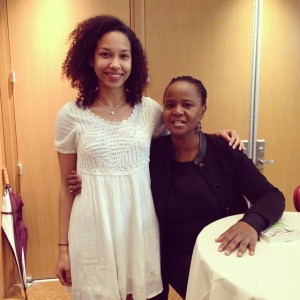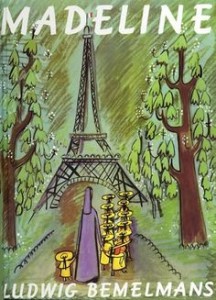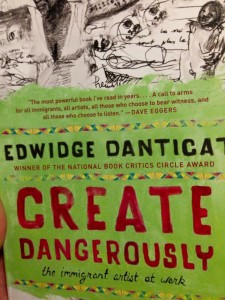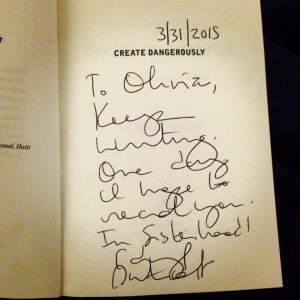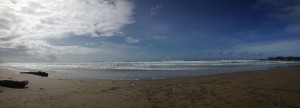When people ask me how I like my college, I always respond the same way: “I love it.” I am challenged here, cared for here, supported here. I am involved. I am engaged. I am busy.
I am happy.
Most of the time.
But. There are bad days. Bad weeks. There are unexpected challenges, and I find myself breaking into pieces, watching emotion well through the cracks I have splintered in myself.
It is important, in the midst of the college decision season, to tell you, these times happen. I feel a duty to admit this and to embrace it. We cannot feel joy all the time. I miss my mom. My laptop broke. I was worried about registration. I’m stressed about a research project. I’m sick. This week, I am floundering.
But what it is important to recognize, I think, is that even on these days, this is still an incredible community.
It is easy, when walking around Puget Sound’s campus, to be struck with the idyllic beauty of our world. It is easy when one is admitted to colleges to feel as though you are being overwhelmed with impressiveness of the American University Experience. It seems almost to sparkle. Often, I sparkle too, shining in the light of all the things I see and do here. But this is not always how college feels. It is scary sometimes, difficult sometimes. It is a process of being stretched, pulled wider and longer, a process of expanding. And expanding can hurt.
That’s okay. That’s natural. It is no cause for alarm, and in fact I think bad days deserve our attention and our respect too. Because if every day was the best of our lives, how would anything feel special?
I suppose what I am trying to emphasize is that college isn’t about good days. It is about all days. It is about diving in. That means sunny afternoons on the quad that are like something out of a catalog, that glossy, but it also means listening to John Mayor in my dorm room, nursing my heartache. It means having faith in myself, my school and my community. It means waking up again in the morning, to do it all again.
Category Archives: Uncategorized
The Get Away
I thought coming to college there would be time to explore Canada, all over Washington and possibly Oregon. But in actuality college is more time-consuming, travel time is too much time. I think the only time I’ve been to Seattle is for crew regattas and Thanksgiving with my roommate, there isn’t even time to make that 45min-1hour drive. But the one thing we have is technology. The ability to stay in contact, if we so wish with our friends and family, to make friends and explore other places through those new snapchat events.
The Disability Closet
I have a mental illness. When I was sixteen, I was diagnosed with Obsessive Compulsive Disorder. That was a very painful time for me—I spent a lot of it crying. At one point, my mother and I wondered if I would be better off in a psychiatric ward. We went to a friend’s Halloween party instead. I put on my Maximum Ride costume, carved a scary pumpkin, and resumed living my life. It was one of the best decisions I have ever made.
I’m not alone. According to the informational posters displayed by UPS, one in six students here has an invisible disability. And mine is invisible. Most people wouldn’t notice anything different about me. I eat at the SUB, attend classes, and pursue my dream of being a writer. In short, I appear just like the rest of the student body. I may tell close friends about my disability but for the most part it remains “in the closet.” I do not want people to look at me differently. I do not want to look at myself differently.
Despite this, I was surprised when a professor said that admitting more mentally ill people made campus more “volatile” and that was why we didn’t have as many intense debates. I remember thinking that just because we are mentally ill does not mean we are jerks. This professor judged me without knowing anything about me or my situation. He didn’t even have to look at me. In that moment, I was glad my disability was “in the closet.” I did not want to be thought of as less than.
Why are remarks like these considered acceptable? It would not be acceptable to say that African American students made campus more volatile or that gay and lesbian students made campus more volatile. How are students with mental disabilities different? It is the same concept of isolating a particular group and disparaging it for its difference.
Last week, I heard the word “neurotypical” in conversation for the first time, used to describe people without mental disabilities. I don’t believe any of us are truly normal or neurotypical. We are all different, each and every one of us. I adore murder mysteries. My friend is fascinated by autobiographies. My sister loves anime. Wouldn’t it be nice if we supported our differences? Gave each other tolerance instead of judgment? Why do we feel this need to look down on one another?
None of us are less than because of the things that make us different. We all have the right to acceptance and encouragement. And most importantly, we should accept and encourage ourselves. Let’s all take that thing that makes us “weird” and let it out of the closet. Celebrate it! Because in doing so we celebrate ourselves.
Passover
Today is the fourth day of Passover—and seeing as we are halfway through, I wanted to do a little writing about why this is the best holiday ever.
My family is extraordinarily secular: although I am Jewish, I have never even set foot in a synagogue. I once attended Hebrew school, which lasted until my sister and I were politely asked to leave and never come back following events that were definitely not my fault. My experience with religion has always been fraught with doubt and suspicion and a distinct lack of involvement.
That said, Judaism is not just a religion. I have heard the Jewish people referred to as an ethno-religious group (in anthropologic terms), and I like that because it insists upon what we all know: the Jewish people are multitudinous and varied and they don’t all look like that one bar mitzvah boy (huge pet peeve and you totally know what I am talking about) and the religion part, while important, is not the sum total.
My family always, always, celebrated Passover. It was my single greatest connection to the Jewish religion and the Jewish culture: sure, we celebrated other holidays, but none of them ever had the same meaning as Passover.
Passover is culture building. I do not say this in an exclusionary way: in fact, we are taught that when the Israelites left Egypt a “mixed multitude” left with them. But on Passover, everyone repeats the same story, everyone remembers what our ancestors suffered through, everyone celebrates.
Passover celebrates, in essence, liberation from operation. During Passover, we rejoice in the liberation of the Jewish people from slavery at the hands of the Egyptian. However, Passover also acknowledges the many kinds of oppression that still exist today, and most importantly, it teaches that no one can ever be truly liberated until everyone is liberated.
Here at Puget Sound, Hillel holds a Seder the first night of Passover. On Friday, anyone who was willing to cough up seven dollars to cover the amount of Manischewitz settled down to a slightly rowdy ceremony. The food was decent, although the horseradish was not hot enough (my grandmother always makes fresh horseradish and it makes your eyes bleed), the singing was enthusiastic, and the atmosphere was on point.
During the Seder, one of the leaders of Hillel brought up an article they read about counterintuitive lessons from the Passover story: it reminds us that we are both oppressed and oppressor, it teaches us that we need to act instead of waiting for divine intervention, and that instead of being liberated from we are being liberated to. You can read the article here, and note that these are not the only lessons from Passover, but they are the ones most often forgotten.
Chag Sameach!
Confessions of a Second Semester Senior
We’re halfway through spring semester (and this first blog post is long overdue)! I’ve been up to a whole lot guysss…
So, I was lame and spent Spring Break on our beautiful, lonely, rain-full campus (Close to going on a backpacking trip to Death Valley with Puget Sound Outdoors, I decided to save for a trip to Mexico this summer with my best friend), which allowed me to recover from a very caffeine-intensive, high-stakes, sleep-deprived midterms week. During this free time, I hibernated for three days (because I was lucky enough to have all of my exams and assignments due the Friday before spring break!), repeatedly indulged in “the cookie” from the metropolitan market, and then got back to work again… on the job search and getting ahead on schoolwork because, for seniors like me, we have 6. Weeks. Till. Graduation.
The truth is, I’ve mostly been looking forward to graduating since the beginning of senior year. Yea, I love learning at UPS and I’m sure there are things I take for granted now that I’ll come to miss. Maybe that we actually get rain here, maybe I’ll miss being surrounded by people my age. But really, I’m so ready to get out of the bubble!
I should be more terrified than I am, considering I don’t have solid plans or a job lined up yet. Also, I’ve had to remember to graduate first (and pass BIO 111), before stressing over the future.
In the past two years I’ve discovered that what I really want to do is pursue a career that combines social justice and cultural heritage with the arts and education. I’ve been looking at masters programs in cultural and arts institution management at universities in Spain and Mexico. For now, the plan is to stay in the Seattle/Tacoma area for another year or two before exploring opportunities abroad, ojalá.
I know right, borrring. I really have been up to more interesting things!!! Here are titles of blog posts to come in the next 6 weeks. (Listing them here as motivation to actually write them!)
Meeting important people
No más
The Anthropocene
The German girls of UPS
Black Lives Still Matter
Undocumented Poetry
Spanish Matters
Los pasos perdidos
(In the meantime, soakin’ up the rest of this college life while I still can.)
Fundraising for Rome!
This semester there’s a course being offered on the art, architecture, and spacial studies of Ancient Rome. It’s a Connections course that culminates in one particularly awesome thing: an ACTUAL trip to Rome!!
For the first three weeks of summer, our small class will be staying in Italy and visiting all sorts of incredible cities, museums, and landmarks. We’ll be staying at the university of Washington’s Rome Center which is in a courtyard where a lovely market is held, and using their studio space to study and create art. Continue reading
Continue reading
How to “Create Dangerously”
Hello, I’m Olivia Perry, a senior and Social Media Assistant for The Admission Office.
I wanted to share my amazing experience last night that was provided to me by this great school!
I was invited by President Ronald Thomas to join him, his wife, Mary, professors, faculty, and students to have dinner with acclaimed Haitian-American writer Edwidge Danticat! As a Creative Writing major, and as someone who read her in a class at Puget Sound, I was very excited to see Ms. Danticat lecture “Create Dangerously”, and to meet her was a bonus!
At dinner, President Thomas opened up the floor to ask Ms. Danticat questions, an opportunity I was quick to take. I first asked when she decided that she wanted to be a writer. She told us that she was given the book Madeline when she was four. When she realized this was a way to tell stories without verbally telling them, she decided that was what she wanted to do.
I later asked if she had any advice for a writing major, a specifically woman of color, and her advice was something that I took to heart. She told me that I just need to write. I should always have a project to work on as leisure. As someone who feels the need to explain herself, a woman of color needs to not be deterred in anyway from what she has chosen to study and create. And as she spoke, she looked right into my eyes, giving me a sense of how genuine she is.
Her lecture, Create Dangerously, named after her 2010 book Create Dangerously: The Immigrant Artist At Work, was not as long as expected but was full of insightful anecdotes and ideas. She spoke of writers becoming the reader and what should and shouldn’t be written about. When she was finished, she answered questions regarding education and politics in Haiti and the Caribbean and shared her excitement for the next generation of, not only Haitian, all up and coming Caribbean writers.
They were selling her books at the lecture and reception, so naturally I bought one and she signed it for me!
Last night was a great event that I would never have experienced if I did not come to this school and become involved around campus. As a senior, I have to say, go to as many lectures as possible! I have gotten to see amazing and well known people, like Junot Diaz and Anis Mojgani, speak in my years here. It is a great opportunity that current and future students should always be taking advantage of!
0.003 Leagues under the Sea
“Yes, yes, yes!” I screamed. I had finally managed to get my weight belt off and on in the water. In case you were wondering, sliding a heavy weight belt on under an even heavier tank is harder than it sounds. There isn’t a lot of room down there. Getting it back on successfully was the last thing I had to do to get my scuba certification. This semester, I have been taking a scuba class and this weekend was our first weekend practicing in the open water.
The first day was challenging for me. My mask was way too tight. When I exhaled the bubbles actually went out the bottom instead of the top. Things were pretty blurry for a while. At one point I was practicing taking my regulator out of my mouth and putting it back in when my mask flooded. For a few seconds down there, I was fumbling around accidentally sucking in water instead of air. Luckily my instructor found my regulator and got it back in my mouth. Fun fact: If you lose your air supply twenty feet underwater, your only thought is getting it back. It really puts things in perspective. That anxiety you had about being the third wheel on a buddy team—suddenly not important.
I had to go back to shore after that. You can’t dive if you can’t see. So I was a little nervous going into today’s lesson. Barring an unfortunate incident with my vest strap everything went smoothly. Diving is relaxing. You have to breathe slowly and deeply in order to use your oxygen supply efficiently, which automatically reduces tension. Normally I chose to relax by either drinking a cup of tea or hitting a punching bag (seems paradoxical I know). But it turns out that floating weightlessly under thirty feet of water works too. You just drift there and keep your eyes open for cool aquatic life. I saw a sea cucumber, some coral, and lots of translucent little fish that looked like crawdads.
I recommend you try diving sometime. Through diving, I learned that if there’s a hole or crevice with a lot of crab parts scattered around it an octopus probably lives there (octopi eat crabs). That bubbles under water look silvery and metallic. And that if you can’t see, for God sakes, don’t take your regulator out of your mouth.
Playtime
I am cast in Hamlet, one of the Senior Theater Festival’s productions this year. When I got to rehearsal last night, my cast members gathered, laughing and talking. We stretched, put our bags away, sipped our last sips of water, glanced over highlighted scripts. And then we naturally fell into a circle, expanding for each new member as they arrived.
Then? My favorite part of rehearsal began, a part I think is important.
“Let’s play a game.”
And we did—we pointed finger guns at each other and squealed when someone was “Shot”. We let go of our inhibitions, and for a moment we forgot to be adults. We were just children—children in a room, pretending.
We forgot our papers and tests and the lines we hadn’t memorized yet and our friends in the outside world and the missed phone calls from our mothers, and we became fully immersed.
I believe in games. I think they are not only fun but very, very valuable.
People often don’t want to play once they reach adulthood, and that is a travesty. Children play games because children understand the magic of them, the way that people are transformed by the chance to leap into engaging with one another.
We so rarely allow ourselves to just be with others, to do something silly. But silly is not frivolous—silly is necessary. Silly completes us.
So, on this sunny Thursday afternoon, I challenge you, Loggers, to play. Throw a Frisbee, or race, or play hide and seek.
You are adults, but that doesn’t mean that you can’t, today and every day,let yourself be totally free, just for a few moments.
Playing might surprise you.
Waves (Spring) Breakin’
Over spring break, I went to Newport, Oregon, with my family. I know, technically speaking, that Newport, which is a coastal town, is not really within the commonly traveled radius of people in Tacoma. But the coasts in the Pacific Northwest are glorious, and I had the best time ever.
Normally I write a lot of words, but today I am just going to let the pictures speak for themselves.
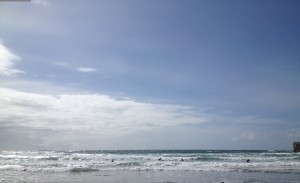
The water is super cold at this time of year, but that doesn’t stop some people. It stops me, but not some people.
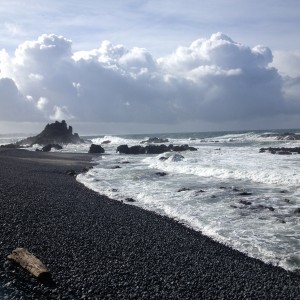
The world famous cobbled beach at Yaquina Head. It might look like it is going to rain soon, but it didn’t.
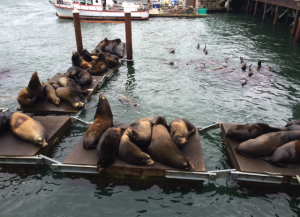
The resident sea lions aka the noisiest, cutest animals in Newport. My sister described them as giant black jelly beans that don’t shut up. Look at them cuddling each other. Look at them.
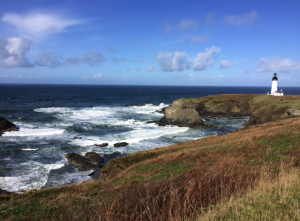
Yaquina Head Lighthouse in the distance. We climbed to the top of it, where we then engaged in a furious trivia battle to win buttons. My family is wild.
The sun was shining at the Oregon coast. The seafood was so fresh – well, it had been alive that morning. We went to sleep with the sound of the waves in our heads. Everyone was in a good mood.

